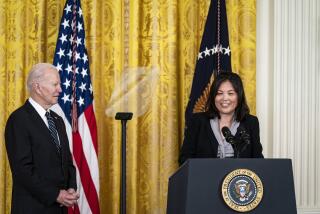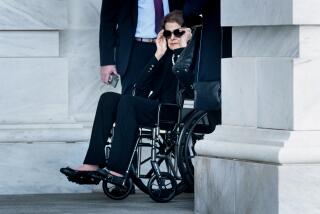Yellen gains allies for top job at Fed
WASHINGTON — In an era of unprecedented efforts by the Federal Reserve to bolster the economy, add another first — a highly public campaign to influence the selection of the central bank’s next chief.
Supporters of Fed Vice Chair Janet L. Yellen have been outspoken recently in boosting her candidacy to replace Chairman Ben S. Bernanke, whose second four-year term expires in January.
About a third of the Senate’s 53 Democrats signed a letter urging President Obama to appoint the former UC Berkeley economist and onetime president of the Federal Reserve Bank of San Francisco to the job.
Lawmakers such as House Minority Leader Nancy Pelosi (D-San Francisco) have offered support as if they were weighing in on a presidential primary. And some influential figures in finance, including former Fed Gov. Alan Blinder and former Federal Deposit Insurance Corp. Chairwoman Sheila Bair, have touted Yellen’s candidacy.
“It’s rare to have this much public discussion about who the president should appoint,” said Allan Meltzer, a Fed historian at Carnegie Mellon University.
Bernanke has raised the Fed’s profile, dramatically expanding its operations and role in the economy. He also has opened up the decision-making process, holding the Fed’s first regular news conferences and reaching out to the public through such events as a televised town hall meeting and an interview on CBS’ “60 Minutes.”
Partly as a result, the interest in who will succeed him is high.
Yellen supporters have gone public to try to counter the growing impression in Washington that the other leading candidate for the job, former Treasury Secretary Lawrence H. Summers, is the favorite to succeed Bernanke.
Summers developed a close relationship with Obama while serving as his top economic advisor in 2009-10, and several Summers proteges populate the White House inner circle. But he carries some baggage.
Some Yellen backers also are motivated by concern that certain criticisms of her, such as that she’s soft-spoken, have sexist undertones.
The Fed hasn’t had a female chair in its 100-year history.
“Yellen is clearly the most qualified successor to follow Ben Bernanke. There is no reason to pass her over for less-qualified males,” Bair wrote in a recent column on the Fortune magazine website. “Yellen already has a ‘Y’ in her name; she doesn’t need one in her chromosomes.”
The nomination of a Fed chair normally is closely followed only by economists, high-level investors and a small cadre of lawmakers with oversight of the 100-year-old central bank.
The chairman’s role gained more public awareness when Paul Volcker fought runaway inflation in the early 1980s and Alan Greenspan, nicknamed “the Oracle” for his well-parsed comments, guided the nation through the big economic booms and busts during his long tenure under four presidents from 1987 to 2006.
But the Fed’s actions to battle the Great Recession and financial crisis have greatly raised the stakes for its top job.
The next Fed chief will have the difficult task of starting to reduce some of the steps it has taken to stimulate economic growth and lower unemployment, including tapering the $85 billion in bonds the central bank has been buying each month since September to push down long-term interest rates.
“There seems to be an exceptional amount of interest in who the next Fed chairman is going to be, and I think a big reason is, this has been an exceptional time for our central bank,” said James Pethokoukis, who blogs about money and politics for the American Enterprise Institute, a conservative-leaning think tank.
Administration officials have said Yellen and Summers are the front-runners to replace Bernanke, who is not expected to seek another four-year term.
Further fueling the push for Yellen is a distaste by many liberals for Summers.
He was a key player in the Clinton administration when it agreed to tear down the wall between federally insured commercial banks and uninsured investment banks, allowing them to own each other, and to avoid regulating complicated derivative securities.
Coupled with loose enforcement of remaining financial rules under President George W. Bush, those changes have been blamed for helping trigger the 2008 worldwide financial crisis.
Summers also angered many on the left when, as president of Harvard in 2005, he suggested women were underrepresented in science and engineering because they lacked the aptitude of men. Controversy over the comments led to his resignation from the post a year later.
Summers has a reputation as being brilliant, but difficult to deal with.
“A lot of people have strong feelings about Summers,” said Dean Baker, co-director of the Center for Economic and Policy Research, a liberal think tank. “Some of it, no doubt, is personal.”
Baker wrote a column this week for the Guardian website arguing that Summers would be a bad choice to succeed Bernanke. Other liberal sites, such as Huffington Post and the Nation, have run anti-Summers columns recently, and the DailyKos site launched an online petition urging Obama not to choose Summers and “consider instead appointing a more qualified woman, such as … Janet Yellen.”
The message to pick Yellen was more direct from Democratic senators who signed a letter circulated by Sen. Sherrod Brown (D-Ohio).
The letter touted Yellen’s “impeccable resume,” which includes extensive monetary policy experience and a stint as chair of the White House Council of Economic Advisers under Clinton.
Some prominent Democrats, including Sens. Barbara Boxer and Dianne Feinstein of California and Elizabeth Warren of Massachusetts, were among the senators who signed.
“The president has an incredible opportunity here to make history by choosing someone who has the right experience, has consistently made the right calls and has the right perspective and judgment to continue our economic recovery,” Boxer said about her support for Yellen.
Feinstein said that Bernanke has done a good job and that it made sense to elevate the person who has been his No. 2 at the Fed since 2010. The historic nature of nominating Yellen was an added bonus, Feinstein said.
“I just think she’s the best-suited for the job right now — and it would be nice to have a woman” in the position, Feinstein said.
Signs of rising interest in the Fed were evident in 2009 when Obama renominated Bernanke for a second four-year term. With the economy just emerging from the Great Recession, Bernanke was confirmed 70 to 30, the narrowest margin ever for a Fed chief.
Boxer and 10 other Democrats opposed his confirmation then because they didn’t think the Fed was doing enough at the time to help average Americans.
The confirmation of the next Fed chair could be even more contentious if it is Summers, said Chris Krueger, a senior policy analyst at financial services firm Guggenheim Partners in Washington.
Summers is likely to draw some liberal Democratic resistance because of his deregulatory actions in the 1990s, as well as a lot of Republican opposition because he was a key player in Obama’s first-term economic policies.
“Yellen is an incredibly safe pick and would be confirmed,” Krueger said. “A Summers confirmation battle would be, I think, extraordinarily difficult.”
More to Read
Inside the business of entertainment
The Wide Shot brings you news, analysis and insights on everything from streaming wars to production — and what it all means for the future.
You may occasionally receive promotional content from the Los Angeles Times.











